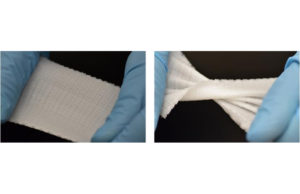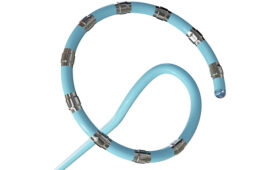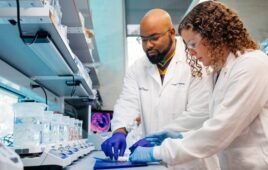
(Image courtesy of Drs. C. Shin/G. Acharya/Baylor College of Medicine)
Some hernia mesh implants have been associated with adverse post-surgical complications. So researchers at Baylor College of Medicine have developed a 3D-printed biomesh to support and reinforce the damaged abdominal wall and facilitate the healing process.
Mesh implants may fail because they promote the adhesion of the intestine, liver or other visceral organs to the mesh. As the adhesions grow, the mesh shrinks and hardens, potentially leading to chronic pain, bowel obstruction, bleeding and poor quality of life. Some patients may require a second surgery to repair the first.
“Inflammation is also a serious concern,” said Dr. Ghanashyam Acharya, associate professor of surgery at Baylor, in a news release about the new biomesh. “Currently, inflammation is controlled with medication or anti-inflammatory drugs, but these drugs also disturb the healing process because they block the migration of immune cells to the injury site.”
“Although hernia mesh implants are mechanically strong and support abdominal tissue, making the patient feel comfortable initially, it is a common problem that about three days after surgery the implant can drive inflammation that in two to three weeks will affect organs nearby,” added Dr. Crystal Shin, assistant professor of surgery at Baylor College of Medicine and lead author of the study looking to find a solution to postsurgical hernia complications. “To address these complications, we developed a non-pharmacological approach by designing a novel mesh that, in addition to providing mechanical support to the injury site, also acts as an inflammation-modulating system.”
Opposites attract
“A major innovation to our design is the development of a biomesh that can reduce inflammation and, as a result, minimize tissue adhesion to the mesh that leads to pain and failure of the surgery,” Shin said. Inflammatory mediators called cytokines appear where the mesh is implanted a few days after the surgery. Some of the main cytokines in the implant, IL1-β, IL6 and TNF-α, have a positive surface charge due to the presence of the amino acids lysine and arginine.
“We hypothesized that biomesh with a negative surface charge would capture the positively charged cytokines, as opposite electrical charges are attracted to each other,” Acharya said. “We expected that trapping the cytokines in the mesh would reduce their inflammatory effect and improve hernia repair and the healing process.”
To test their new idea, the researchers used a 3-D bioprinter to fabricate biomesh of a polymer called phosphate crosslinked poly (vinyl alcohol) polymer (X-PVA). Through experimentation, they optimized the mechanical properties so the mesh would withstand maximal abdominal pressure repeatedly without deterioration of its mechanical strength for several months. They also worked to show that their biomesh did not degrade or reduce its elastic properties over time and was not toxic to human cells.
Shin, Acharya and their colleagues have confirmed in the lab that this biomesh can capture positively charged cytokines, according to the news release. Encouraged by these results, the researchers tested their Biomesh in a rat model of hernia repair, comparing it with a type of mesh extensively used clinically for surgical hernia repair.
Fewer complications
The biomesh effectively minimized postsurgical complications of hernia repair in an animal modelm, according to the researchers. Four weeks after it was implanted, they examined the biomesh and found it had captured about three times the amount of cytokines captured by the commonly used mesh. Cytokines are short-lived in the body. As they degrade, they enable the mesh to capture more cytokines.
No visceral tissues had adhered to the biomesh, while the level of tissue adhesion was extreme in the case of the commonly used mesh. Nor did it hinder abdominal wall healing after surgical hernia repair in animal models, the study showed.
The researchers are conducting further preclinical studies before their approach can be translated to the clinic. Fabricating the biomesh is highly reproducible, scalable and modifiable, Shin said.
Read the complete study in the journal Advanced Materials.




